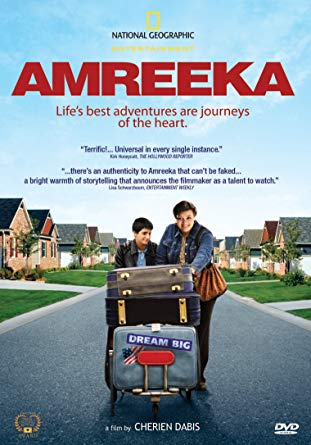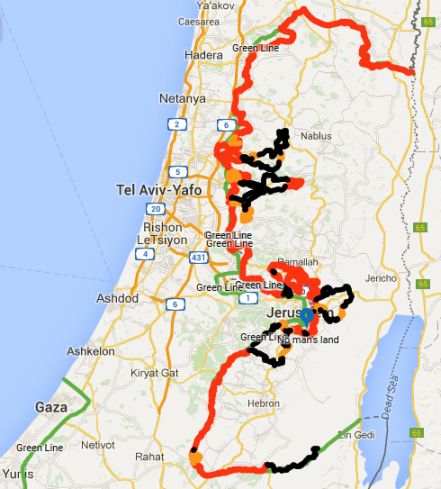A tale of dispossession, emigration, hope ___ 10/10
Review initially posted October 2014. It remains topical today, except 10 years of slow genocide and ethnic cleansing by Israel have made matters much, much worse. — bw
 Immigration Official: Occupation?
Immigration Official: Occupation?
Muna Farah: Yes… 40 years.
“What’s with ‘the Wall,’ man?”
After watching Amreeka, I can put faces on the effects of a twisted foreign policy that sends American tax funds to the Zionist occupational government (ZOG) of Israel.[1] And they’re friendly faces, too… at least the Palestinians. The film begins with Muna Farah (Nisreen Faour) performing some errands in her Palestinian village amidst the rubble and random patrols of ZOG police and soldiers, ca. 2003, just before the American invasion of Iraq. You see the story germinating right there; her husband has taken up with some hottie and basically abandoned Muna… who, with her young teenage boy Fadi (Melkar Muallem), lives with her mother and other extended family, scraping by.
Nisreen Faour Muna Farah
Melkar Muallem Fadi Farah
Hiam Abbass Raghda Halaby
Alia Shawkat Salma
Jenna Kawar Rana Halaby
Selena Haddad Lamis Halaby
Yussuf Abu-Warda Nabeel Halaby
Joseph Ziegler Mr. Novatski
Muna works as an administrator in a bank. The Wall—this monstrous despoiler of anything resembling human communities erected by the ZOGs in the West Bank, for, well, the same reasons the communists erected the Berlin Wall, or that any state erects barriers: apartheid, dispossession, genocide—is going up. What used to take 20 minutes now requires two hours. More, if she is stopped and questioned at the numerous ZOG checkpoints.
We accompany her and her son on a weekend shopping trip. The digital video camera captures the essence of any occupation: “Papers?”
A couple of ZOG security officers interrogate her for no reason, they want to know her street address. She informs them they don’t use house numbers where she lives. It’s obvious the officers are aware of that fact, and, indeed, they make a point of it, proceeding to ridicule her and the boy as members of a race of inferior beings… so savage and primitive they don’t even use house numbers. Ha Ha Ha.
Then Fadi talks back to the ZOGsters. They don’t like that at all, and proceed to get him out of the car, forcing him to lift his shirt up time and time again, as if to prove he’s not carrying a bomb. It’s humiliating, it’s dehumanizing, and Muna pleads with the ZOGs to let them go. “He’s only a boy, he’s sorry, he didn’t mean anything by it.” She realizes these uniformed guys can cart away her son without so much as a “Have a Nice Day.” And she’ll never see him again. Happens all the time. Continue reading

